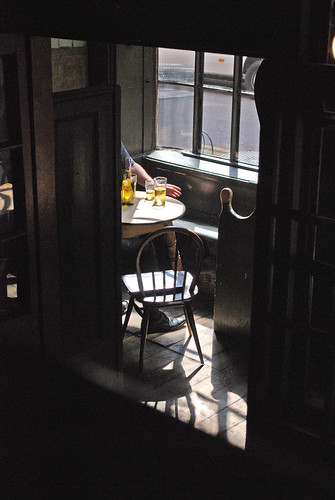
{Photo of the Jerusalem Tavern by rocketlass.}
As I was reading Ross Macdonald's The Moving Target on the train today, a scene in a bar reminded me of a line from the Paris Review interview with James M. Cain that I drew from on Wednesday. Cain talks about visiting a brothel in 1910, when he was eighteen and too nervous (or fearful of disease) to do much more than dance with the women and drink the expensive beers at the bar:
At one of these places you could buy a bottle of beer for fifty cents. "Small as a whorehouse beer" was an expression then. They'd serve them up in glasses so small that thimbles were twice as big.What brought Cain's whorehouse beer back to mind today was a scene where Macdonald's bruised paladin Lew Archer finds himself in a swank Hollywood bar:
The back room of Swift's was paneled in black oak that glowed dimply under the polished brass chandeliers. It was lined on two sides with leather-cushioned booths. The rest of the floor space was covered with tables. All of the booths and most of the tables were crowded with highly dressed people eating or waiting to be fed. Most of the women were tight-skinned, starved too thin for their bones. Most of the men had the masculine Hollywood look, which was harder to describe. An insistent self-consciousnesss in their loud words and wide gestures, as if God had a million-dollar contract to keep an eye on them.Hoping to make contact with a lead on a case, Archer has no choice but to belly up to the bar:
I went to the bar against the third wall and ordered a beer.If that's an expensive beer in 1949, it makes that fifty-cent whorehouse beer from 1910 seem pricey, no?
"Bass ale, Black Horse, Carta Blanca, or Guinness stout? We don't serve domestic beer after six o'clock."
I ordered Bass, gave the bartender a dollar and told him to keep the change. There wasn't any change. He walked away.
Of course, with Archer, true costs are never measured in dollars, and this scene is no exception. Over the course of several hours and several bars, Archer purposefully pushes a washed-up, aging actress deep into an unpleasant drunkenness and holds her head under the alcoholic waves, hoping she'll slip up and tell him what he needs to know about her role in his case. The further she sinks into drunknenness, the further Archer sinks into self-loathing:
I tried smiling to encourage myself. I was a good Joe after all. Consorter with roughnecks, tarts, hard cases and easy marks; private eye at the keyhole of illicit bedrooms; informer to jealousy, at behind the walls, hired gun to anybody with fifty dollars a day; but a good Joe after all. The wrinkles formed at the corner of my eyes, the wings of my nose; the lips drew back from the teeth, but there was no smile. All I got was a lean famished look like a coyote's sneer. The face had seen too many bars, too many rundown hotels and crummy love nests, too many courtrooms and prisons, post-mortems and police lineups, too many nerve ends showing like tortured worms. If I found the face on a stranger, I wouldn't trust it.Yet he keeps the woman's glass full, for he's pledged himself to find a missing man, and her dipsomania is the only tool to hand. If the cost of using that tool is a bitter self-knowledge that most of us would prefer to lie ourselves away from, he's willing to bear it. It's an excruciating scene.
No comments:
Post a Comment